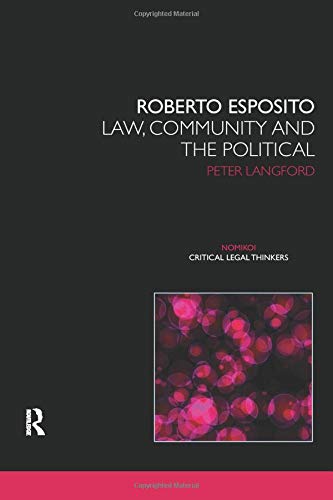The experience, revealed by the presence of the further Latin term munus within communitas, is that of an aporia. The aporetic experience, arising from the term munus, becomes the re-conception of the notion of the gift.
The origin of the gift in the term munus establishes its primacy in relation to the other Latin term for gift, donum. The term donum is, for Esposito, a derivative category which is conditioned by the more fundamental term munus. Donum expresses the conventional structure of gift exchange in which reciprocal relations of giving and receiving are created, maintained or extinguished. The conventional structure of the donum rests upon an absolute gift – munus – which precedes, and can never be exhausted by, this conventional structure. The effect of the absolute gift of munus is that of the primacy of ethics over a theoretical or practical reason centred on the subject. The primacy installed by this ethics is not in the form of a positive ethics a theory of virtue – but in the form of a negative ethics – an experience of aporia.
The aporetic experience is of a ‘common non-belonging’ in which the common is distinguished and detached from modem and contemporary political and social theory. This experience is one of an exposure to an obligation which attests to the subject’s fundamental lack of substance and, with this, its insubstantial connection with others: they share nothing in common beyond their finitude. The experience reveals that the subject is not contained within, nor attached to, a community as another subject or subject-like entity. Hence, the common, as the munus within communitas, is the openness or exposure of the community to alterity.
The exposure to alterity is simultaneously ‘the most extreme of its possibilities’ and ‘the riskiest of threats’: ‘the constitutive danger of our co-living’. For the munus within communitas generates:
«the unreachable Object into which our subjectivity risks falling and being lost. Here then is the blinding truth that is kept within the etymological folds of communitas; the public thing [res publica] is inseparable from the no-thing. It is precisely the no-thing of the thing that is our common ground.»
– Langford, P. (2015). Roberto Esposito: Law, community and the political. London: Routledge.
In this experience of the absence of a positive, independent foundation, the subject becomes aware of its being conditioned by the munus. The sense of the withdrawal of this foundation becomes the recognition that the munus ‘constitutes us and makes us destitute in our moral finiteness’. (p.70)
Esposito: munus > communitas

